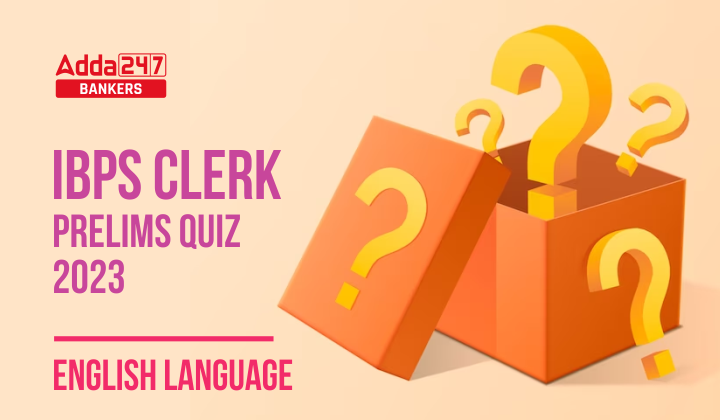Directions (1-10): Read each sentence to find out whether there is any grammatical or idiomatic error in it. The error, if any, will be in one part of the sentence. The number of that part is the answer. If there is ‘No error’, the answer is (e). (Ignore errors of punctuation, if any).
Q1. The Constitution were not the (A)/ starting point but a mere (B)/ culmination of India’s (C)/ long-standing integrative traditions (D)/.
(a) A
(b) B
(c) C
(d) D
(e) No Error
Q2. The policy towards the (A)/ Indian diaspora comes below (B)/ the exclusive jurisdiction (C)/ of the central government (D)/.
(a) A
(b) B
(c) C
(d) D
(e) No Error
Q3. There needs to be an inspire alternative (A)/ agenda that enthuses India and (B)/ which can move the silent majority (C)/ away from the climate of hate (D)/.
(a) A
(b) B
(c) C
(d) D
(e) No Error
Q4. News of India’s accession (A)/ to the Artemis Accords (B)/ has been meet with great (C)/ interest within the space community (D)/.
(a) A
(b) B
(c) C
(d) D
(e) No Error
Q5. Almost every day in winter (A)/ I would need to use salve (B)/ on my dry, crackling skin (C)/ so that it should be moisturized (D)/.
(a) A
(b) B
(c) C
(d) D
(e) No Error
Q6. The sickly young woman pale (A)/ and etiolated skin caused (B)/ the children in the neighborhood (C)/ to label her a vampire (D)/.
(a) A
(b) B
(c) C
(d) D
(e) No Error
Q7. The young professor thought (A)/ he knew everything (B)/ and was to arrogant to (C)/ listen to his mentor’s advice (D)/.
(a) A
(b) B
(c) C
(d) D
(e) No Error
Q8. Setting forest fires (A)/ is a flagitious act (B)/ because it endangers wildlife and destroys (C)/ local home (D)/.
(a) A
(b) B
(c) C
(d) D
(e) No Error
Q9. Our family is a tight-knit group (A)/, and we enjoy to go on (B)/ family vacations together (C)/ several times a year (D)/.
(a) A
(b) B
(c) C
(d) D
(e) No Error
Q10. During the church service (A)/, the minister spoke about (B)/ monogamy and the holiness of (C)/ marriage among two people (D)/.
(a) A
(b) B
(c) C
(d) D
(e) No Error
Solutions
S1. Ans. (a)
Sol. Part (A) has a grammatical error. The verb “was” should agree with the singular noun “Constitution.” The verb “were” is used in the plural form, but the subject of the sentence is “The Constitution”, which is singular. Therefore, the correct verb form should be “was”. To make the sentence grammatically correct, the word “were” should be replaced with “was”.
The other parts of the sentence are grammatically correct.
Therefore, the correct sentence would be: “The Constitution was not the starting point but a mere culmination of India’s long-standing integrative traditions.”
S2. Ans. (b)
Sol. Part (B) has a grammatical error. The word “below” is used incorrectly in the sentence. It should be “under”.
The word “below” is used to indicate a position that is lower than something else. In this sentence, the policy towards the Indian diaspora is not lower than the exclusive jurisdiction of the central government. It is under the exclusive jurisdiction of the central government.
The word “under” is used to indicate a position that is lower than something else, or to indicate that something is subject to the control of something else. In this sentence, the policy towards the Indian diaspora is subject to the control of the central government.
Therefore, the correct word to use in this sentence is “under”.
The other parts of the sentence are grammatically correct.
Therefore, the correct sentence would be: “The policy towards the Indian diaspora comes under the exclusive jurisdiction of the central government.”
S3. Ans. (a)
Sol. Part (A) has a grammatical error. The correct form is “an inspiring alternative” instead of “an inspire alternative.” The adjective “inspiring” is required to modify the noun “alternative.” To make the sentence grammatically correct, the word “inspire” should be replaced with “inspiring”.
The other parts of the sentence are grammatically correct.
Therefore, the correct sentence would be: “There needs to be an inspiring alternative agenda that enthuses India and which can move the silent majority away from the climate of hate.”
S4. Ans. (c)
Sol. Part (C) has a grammatical error. The correct form is “has been met” instead of “has been meet.” The past participle of the verb “meet” is “met,” which is required in this sentence. To make the sentence grammatically correct, the word “meet” should be replaced with “met”.
The other parts of the sentence are grammatically correct.
Therefore, the correct sentence would be: “News of India’s accession to the Artemis Accords has been met with great interest within the space community.”
S5. Ans. (d)
Sol. Part (D) has a grammatical error. The correct form is “so that it would be moisturized” instead of “so that it should be moisturized.” When expressing a hypothetical or unreal condition in the past, the verb “would” is used consistently. To make the sentence grammatically correct, the word “should” should be replaced with “would”.
The other parts of the sentence are grammatically correct.
Therefore, the correct sentence would be: “Almost every day in winter I would need to use salve on my dry, crackling skin so that it would be moisturized.”
S6. Ans. (a)
Sol. Part (A) has a grammatical error. The correct form is “The sickly young woman’s pale” instead of “The sickly young woman pale.” The possessive form “woman’s” is needed to indicate that the pale belongs to the young woman. To make the sentence grammatically correct, the word “woman” should be replaced with “woman’s”.
The other parts of the sentence are grammatically correct.
Therefore, the correct sentence would be: “The sickly young woman’s pale and etiolated skin caused the children in the neighborhood to label her a vampire.”
S7. Ans. (c)
Sol. Part (C) has a grammatical error. The correct form is “and was too arrogant to” instead of “and was to arrogant to.” The word “too” is used to indicate an excessive degree, while “to” is a preposition used in various contexts. To make the sentence grammatically correct, the word “to” should be replaced with “too”.
The other parts of the sentence are grammatically correct.
Therefore, the correct sentence would be: “The young professor thought he knew everything and was too arrogant to listen to his mentor’s advice.”
S8. Ans. (d)
Sol. Part (D) has a grammatical error. The correct form is “local homes” instead of “local home.” The word “home” is a singular noun. In this sentence, the word “home” refers to the homes of the people who live in the area where the forest fire is set. The correct plural form of the word “home” is “homes”. To make the sentence grammatically correct, the word “home” should be replaced with “homes”.
The other parts of the sentence are grammatically correct.
Therefore, the correct sentence would be: “Setting Forest fires is a flagitious act because it endangers wildlife and destroys local homes.”
S9. Ans. (b)
Sol. Part (B) has a grammatical error. The correct form is “and we enjoy going on” instead of “and we enjoy to go on.” After the verb “enjoy,” the gerund form (“going”) should be used instead of the infinitive form (“to go”). To make the sentence grammatically correct, the word “to go” should be replaced with “going”.
The other parts of the sentence are grammatically correct.
Therefore, the correct sentence would be: “Our family is a tight-knit group, and we enjoy going on family vacations together several times a year.”
S10. Ans. (d)
Sol. Part (D) has a grammatical error. The correct form is “marriage between two people” instead of “marriage among two people.” The preposition “between” is used to indicate the relationship between two individuals in a marriage whereas the preposition “among” can be used to indicate a relationship involving more than two people or things. To make the sentence grammatically correct, the word “among” should be replaced with “between”.
The other parts of the sentence are grammatically correct.
Therefore, the correct sentence would be: “During the church service, the minister spoke about monogamy and the holiness of marriage between two people.”





 English Language Quiz For Bank Foundatio...
English Language Quiz For Bank Foundatio...
 English Language Quiz For Bank Mains Exa...
English Language Quiz For Bank Mains Exa...





